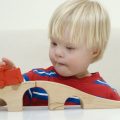- Well, who is he in? - My friend Ira, mother of the five-year Timothy, is lamenting. - Today, on a walk in the kindergarten I threw the cap into a puddle. I ask why, he says, Ilya said so. He is listening to Ilya in everything! How to get rid of such a list? To do this, it is necessary to cultivate a sense of own worth in the child. And the certainty that his own opinion, the opinion of a small person is as important as anyone else's. Even an adult. And still the ability to defend this very opinion. To begin to think about whether you allow the child to make decisions independently, which the family accepts and supports. For example, he chooses where you go on the weekend, he himself comes up with the script of his birthday or expresses his wishes for food. Can he choose his own clothes, decide with whom to play? If all this is obtained with difficulty, it's time to start acting. A photo: GettyImagesTo prevent a child from growing up as a weak-willed and passive person, psychologists advise parents to adhere to several rules. They are simple, but for some reason they are always forgotten. Do not impose your opinion on your child and always be interested in his preferences. If you ask a question, what shirt (dress) he wants to wear, get an answer, agree with his choice. If you see that the choice is clearly not appropriate, explain the reason (reasoned), and suggest other options. By the way, it will help to cope with such a problem, as children's moods. For example, a child does not want to go to the kindergarten. You ask if he will put on a T-shirt with a penguin or a shirt in the box. The child switches to the problem of choice, and hysteria over the garden goes to naught.2. Advise, but correctly. Push to the decision, but do not decide for it. It should be exactly tips, tips, but in no case do not swear. Otherwise, the child will have a negative attitude towards the parents' councils. Yes, yes, after a few years it will be rolling your eyes into the ceiling just at the sound of your voice. Regardless of the quality of the advice. You can just hint that in this case it does not make the best choice, and immediately explain why and how it should be done in such a situation. But if he insists on his own, there will be some consequences for which he will have to bear responsibility. And then the baby let him decide on his own how to do it right. 3. Listen to the child - and to hear. Listening is not only hearing the sound of the voice, individual words and whole phrases. It is important to understand the speaker, not only washed away, but also the child's perception of the topic, his feelings and emotions. Give the child a feedback: he should understand that you hear him, you are interested in his opinion. And in any case, do not break it in mid-sentence: "In short, we do so ..." 4. Never answer the child's question with the phrase: "Because I said so!" First, this formulation does not explain to the child why it is necessary to do so, and not otherwise. Secondly, if he gets used to the fact that everything is decided only by mom (dad), what kind of personal opinion can we talk about? He will understand that it's much easier to take a ready-made solution and stupidly follow the instructions.
A photo: GettyImagesTo prevent a child from growing up as a weak-willed and passive person, psychologists advise parents to adhere to several rules. They are simple, but for some reason they are always forgotten. Do not impose your opinion on your child and always be interested in his preferences. If you ask a question, what shirt (dress) he wants to wear, get an answer, agree with his choice. If you see that the choice is clearly not appropriate, explain the reason (reasoned), and suggest other options. By the way, it will help to cope with such a problem, as children's moods. For example, a child does not want to go to the kindergarten. You ask if he will put on a T-shirt with a penguin or a shirt in the box. The child switches to the problem of choice, and hysteria over the garden goes to naught.2. Advise, but correctly. Push to the decision, but do not decide for it. It should be exactly tips, tips, but in no case do not swear. Otherwise, the child will have a negative attitude towards the parents' councils. Yes, yes, after a few years it will be rolling your eyes into the ceiling just at the sound of your voice. Regardless of the quality of the advice. You can just hint that in this case it does not make the best choice, and immediately explain why and how it should be done in such a situation. But if he insists on his own, there will be some consequences for which he will have to bear responsibility. And then the baby let him decide on his own how to do it right. 3. Listen to the child - and to hear. Listening is not only hearing the sound of the voice, individual words and whole phrases. It is important to understand the speaker, not only washed away, but also the child's perception of the topic, his feelings and emotions. Give the child a feedback: he should understand that you hear him, you are interested in his opinion. And in any case, do not break it in mid-sentence: "In short, we do so ..." 4. Never answer the child's question with the phrase: "Because I said so!" First, this formulation does not explain to the child why it is necessary to do so, and not otherwise. Secondly, if he gets used to the fact that everything is decided only by mom (dad), what kind of personal opinion can we talk about? He will understand that it's much easier to take a ready-made solution and stupidly follow the instructions. Photo: GettyImages5. Let him be in charge.Let your child "turn on the boss" and decide something for the whole family. In this case, we are, of course, not talking about any serious issues or problems. Here we are talking about things like, for example, going on a walk together. Let your child choose where you will go with the whole family on the weekend. This way, your child will feel that his opinion is truly valued and taken into account. 6. Talk to your child as an equal - without sarcasm and irony. Depending on how you talk to your child when he shares his thoughts with you, tells you about something, it depends on whether he will want to continue doing this. Perhaps his experiences seem stupid to you, but in no case should you make fun of them. Psychologists also advise against patting a child on the head or on the shoulder, for children all this is an expressed disdain. Like patting a dog on the scruff. Why is all this necessary? So as not to fall under a bad influence in the future. After all, if a child understands that his opinion is not an empty phrase, then he will be able to defend this very opinion later. And it does not matter where it will be: in communication with peers, in a school discussion or at work. And most importantly, the child will not be led, blindly following someone else's example.
Photo: GettyImages5. Let him be in charge.Let your child "turn on the boss" and decide something for the whole family. In this case, we are, of course, not talking about any serious issues or problems. Here we are talking about things like, for example, going on a walk together. Let your child choose where you will go with the whole family on the weekend. This way, your child will feel that his opinion is truly valued and taken into account. 6. Talk to your child as an equal - without sarcasm and irony. Depending on how you talk to your child when he shares his thoughts with you, tells you about something, it depends on whether he will want to continue doing this. Perhaps his experiences seem stupid to you, but in no case should you make fun of them. Psychologists also advise against patting a child on the head or on the shoulder, for children all this is an expressed disdain. Like patting a dog on the scruff. Why is all this necessary? So as not to fall under a bad influence in the future. After all, if a child understands that his opinion is not an empty phrase, then he will be able to defend this very opinion later. And it does not matter where it will be: in communication with peers, in a school discussion or at work. And most importantly, the child will not be led, blindly following someone else's example.

Making Money with Desserts: Success Stories
Evgeniya Polischuk (Fedutinova) instagram:@evgeniyafedutinovavk.com/janeshomebaking– It all started with baking for family and friends. Gradually, I started posting photos of my baked goods on Instagram – and orders started coming in. I made my first custom-made cake on October 13, 2014, and a little earlier I started making macaroons and cupcakes. You could say that the business “found me”, I am very […]

Soups are cold recipes with photos
Cold cucumber soup with yogurt and lemonsorbet from the chef of the restaurant La Taverna Alexander Zhurkin Photo: Getty Images Ingredients: Plain yoghurt – 125 g Cucumber – 150 g Lemon/lime sorbet – 50 g Cocktail shrimp – 24 g Fresh ginger juice – 1 g Lime juice – 5 g Fresh orange juice – 5 g Parsley – 1 g Pink pepper – 1 g Watercress – […]

barbeque kebab
Pork tenderloin in glaze Photo:Dmitry Bayrak/dbstudioPreparation time: 20 minutes + marinating time.Calories: 454 kcal per serving.For 4 servings: 4 pork tenderloins (approximately 300 g each), 1 onion, 2 cloves of garlic, 1 tsp. lemon zest, 1 tsp. lemon juice, a pinch of ground cumin, coriander and turmeric, 1 tbsp. vegetable […]

Pierre Duacan: dietary recipes: Ducane diet
Beetroot soup Photo:Season’S, Luxury Hotels RepresentationYou will need:· Boiled beetroot – 60 g· Fresh cucumbers – 20 g· Red radish – 20 g· Green onions – 10 g· Egg – 1 pc.· Drinking mineral water – 200 g· Salt – 1 gPreparation:· Boil the egg and beetroot.· Grate the cucumbers, radish and part of the beetroot. Put everything […]





